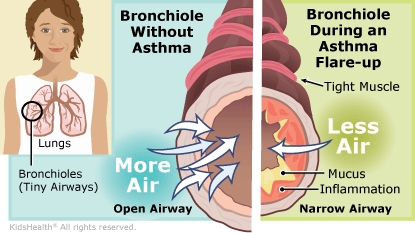An asthma flare-up (also called an asthma attack or exacerbation) is when asthma symptoms get worse. Some kids get a flare-up when they exercise — this is called exercise-induced asthma.
Follow your health care provider's instructions to help control your child's exercise-induced asthma.




Call 911 if your child is struggling to breathe, is too out of breath to walk or talk, or turns blue.

What causes exercise-induced asthma? When we breathe through our noses, air becomes warm and moist on its way to the lungs. But during exercise, we breathe more through our mouths than our noses. This brings cool, dry air directly to the lungs, which can irritate them. Some people with exercise-induced asthma might feel symptoms when the air is warm but polluted or full of pollen. Others might get symptoms when swimming if they are sensitive to chlorine.
How do asthma medicines work? Asthma medicines generally work in two ways:
Some children will get both types of medicines from one inhaler device. They might need to use this "combination" inhaler every day, with added doses from it when they have symptoms. Some older kids with mild asthma might use a combination inhaler only for quick relief when they have symptoms, or before they exercise. Your health care team will help you figure out which inhaler is best for your child, and how and when to use it.
Can my child still exercise or play sports? Yes. In fact, staying fit and exercising regularly can help to reduce asthma symptoms. It can improve lung function by strengthening the breathing muscles in the chest. So kids and teens with asthma should exercise as much as they can. When asthma is well-controlled, kids with asthma can do anything their peers can do. In fact, many Olympic athletes have exercise-induced asthma, but it doesn't stop them from doing their sport and winning medals.